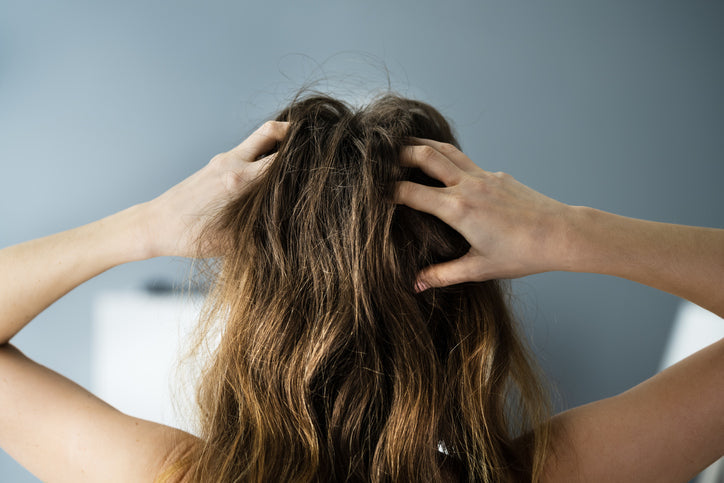Whether you have straight hair or wavy tresses, the quest for gorgeous texture and tousled beach waves often leads to a good sea salt spray — but is salt water actually any good for your hair?
Ocean water and salt have historically been used for their overall healing properties. Salt is a vital mineral for the body, and its benefits are far-reaching. So if you want extra body for your hair and have salt water in your eye line, VEGAMOUR dug into the research and spoke to a dermatologist to get the details. Plus, discover the clinically proven products designed to boost volume and help hair growth.
Salt Water for Skin?
If you've ever returned from a beach vacay with glowing skin and gently wavy natural hair, you might credit the salt water. Since ancient Egypt, salt water has been recognized for its ability to disinfect and cleanse the skin. However, there is little scientific evidence to prove the claims, though it may contain nutrients such as amino acids magnesium, potassium, selenium and zinc, which have antibacterial properties.
Deep ocean water (from a depth of 200 meters or more) may help contain certain skin conditions such as eczema because it can balance essential minerals and reduce toxins. Deep sea water doesn't get much sun exposure; it contains less plant plankton and little bacteria, meaning it contains more nutrients. Research also found that deep ocean water can help with the following:
- Skin cracking
- Inflammation
- Dry skin
- Itchy skin
- Swelling
Salt water can also act as an exfoliant, lifting away excess oils and extra sebum and drawing out dirt. In addition, it can remove dead skin cells and the top layer of skin to prevent buildup. Miami, Florida-based board-certified dermatologist Dr. Anna Chacon told VEGAMOUR, "Sea salt is rich in healthy, skin-friendly minerals like magnesium, calcium, and potassium, which is exactly what makes it so beneficial to various skin conditions. Seawater is a miracle treatment for acne and semi-permanent scars skin cell turnover, helping you achieve a softer skin texture. Salt is also an excellent curing, clearing, and cleansing agent."
If you struggle with blackheads and acne, you might be tempted to wash them away with salt water, but tread lightly — salt scrubs might aggravate sensitive skin and compromise your skin barrier. Always consult with a dermatologist before starting a new routine.
But Is Salt Water Good for Your Hair?
"Salt water does differ in the hair since salt is hygroscopic, meaning it attracts more water to your hair, forming more salt crystals, but this process draws out the moisture inside your hair strands, thus making it dry and brittle," said Chacon.
If you have chemically treated or dyed hair, salt water might cause further hair damage. "Long-term contact with salt water can cause colored hair to fade. To avoid this, apply nourishing hair oil to your scalp and tresses before diving into the sea," said Chacon.
To prevent hair from losing too much moisture and becoming tangled when exposed to sea salt water, try the following:
- Use a natural shampoo to wash the hair thoroughly after a day by the beach and then deeply condition it with a nourishing treatment. The GRO Revitalizing Shampoo and Conditioner Kit will cleanse away lingering impurities from the scalp and leave it silky soft and rehydrated. Rinse with cold water to further protect the hair shaft and leave hair looking shiny. A leave-in conditioner will also help with hydration.
- Protect the scalp by taking a Q-tip, dipping it in sunscreen and then carefully applying it to your hairline and part. This area of the scalp is exposed and can become irritated and painful if burnt by the sun. By protecting the scalp, you'll avoid having a dry and flaky scalp, and in turn, the hair will stay healthy and be easier to manage.
The tiny salt crystals found in sea salt water aren't all bad. Much like it does for the skin, the salty water can act as a natural exfoliator for the scalp, which is especially helpful for those with oily or greasy scalps and naturally greasy hair. Chacon continued, "For a healthy scalp, use salt water to loosen and eliminate dandruff while also boosting blood circulation. Additionally, sea salt inhibits fungal development by absorbing excess oil and moisture."
The benefits of salt water for hair include:
- Salt water can exfoliate the scalp and encourage blood flow. Stimulating blood flow can help more nutrients reach the hair follicles, which can help boost hair growth. A good scalp massage can also help with this, as can a clinically proven natural hair serum.
- Salt water has anti-fungal properties that can help soothe uncomfortable flaky scalps and even dandruff. It can be a double-edged sword, though, because too much salt water can dry skin out, so use with caution.
- You could also think of salt water as a natural shampoo. If you have excess sebum and heavy oils around and on the scalp, the salt will strip away the natural oils and make it smoother. This is very helpful if you have a greasy hair type.
- Salt water crystals add volume and body to the hair by lifting the hair cuticle. Hair roots appear volumized, and you can easily achieve the ever-popular beachy waves. Your hair is made of crosslinks and keratin proteins that determine each hair strand's shape. Crosslinks are three-dimensional binds that are formed by the covalent bonds between adjacent amino acids (proteins). Salt, sodium chloride and magnesium sulfate create extra crosslinks in the hair, giving it a wave or a curl — putting the wave in your beachy waves.
Ocean Water Alternatives
If you live near the ocean, you might be used to the effects of salt water on the skin and hair, but if you're city-bound with no beach in sight, you might struggle. Thankfully, you can create a remedy that mimics the effect of a dip in the ocean relatively quickly:
- Step 1: Mix three parts sea salt with two parts castile soap in a bowl and blend vigorously.
- Step 2: Wash hair with the mixture and massage for about 15 minutes.
- Step 3: Rinse with cold water to completely remove any residue.
You could also blend three tablespoons of sea salt with warm water and massage it into your scalp for up to eight minutes before rinsing. Alternatively, you could mix one tablespoon of sea salt and one tablespoon of warm water, pour it into a spray bottle and wait for the salt to dissolve. Add a spoonful of olive oil or coconut oil to the spray to add a nourishing element, and spray on wet hair to reap the benefits.
Salty Goodness?
Because of the high concentration of minerals and vitamins found in sea salt, it can have immense benefits on the hair and skin when used effectively. But if used excessively or on sensitive skin, it might bring some negative effects. Keeping the scalp clear, soothed and healthy can boost hair growth, and though salt water can do that, it might also irritate. If you want to keep your scalp happy and your hair looking thick, full, long and strong, use clinically tested, all-natural products to strengthen locks and encourage healthy and consistent volume.
More from VEGAMOUR:
- Shop: VEGAMOUR Picks for Men
- Juice for Hair Growth: Can You Drink Your Way to Longer Hair?
- Why Is My Hair Thinning at 20?
Photo credit: Nikolay Draganov/Pexels
Back




















